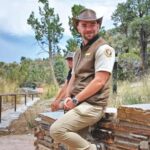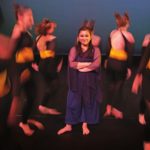
What’s the Buzz? Presence of a Honey Bee Hive Decreases Native Bee Visitation to Native Plant Gardens in Northeast Ohio

Name: Ren Johnson
Major: Biology
Minor: Environmental Studies
Advisors: Jennifer Ison, Reed Johnson, Hilary Edgington; Sharon Lynn (second reader)
Apis mellifera, honey bees, are kept worldwide to pollinate crops and provide honey. In the Americas, honey bees are non-native and compete with native bees for resources. This study seeks to determine if the presence of a managed honey bee hive affects the visitation rate of native bees to flowers in a small urban native plant garden in Northeast Ohio. I hypothesized that native bee visitations would be affected by the presence of a honey bee hive. With a honey bee hive present and absent, I recorded native and honey bee visitation rates to 10 random 0.5 m2 areas of the garden each day for 16 days in May and August 2021. Overall, there were significantly fewer native bee visitations in the presence of a honey bee hive than in the absence of the hive. However, visitation varied between bee taxa, with small bees (less than 1 cm in body length) visiting significantly less when the hive was present, and others showing no significant difference. There were also significantly fewer honey bee visitations in the presence of the managed hive, indicating that the honey bee visitors to the garden were feral and bees from my managed hive rarely visited the garden. So, direct competition for resources in the study site is likely not the cause of the decrease in native bee visitations. If the presence of honey bee hives in urban gardens deters native bee visits, available resources and nesting sites would be reduced, potentially causing native bee populations to decline.
Posted in Comments Enabled, Independent Study, Symposium 2022 on April 25, 2022.
4 responses to “What’s the Buzz? Presence of a Honey Bee Hive Decreases Native Bee Visitation to Native Plant Gardens in Northeast Ohio”
Related Posts
Related Areas of Study
Environmental Studies
Natural sciences, social sciences, and humanities courses combine for those who want to be part of environmental solutions
Major MinorBiology
Explore molecular and cellular biology, ecology and more with top faculty and access to extensive lab facilities.
Major Minor


Hi Ren! This is really interesting and you’ve explained it all very well, so thank you! Wonderful job and all the best for what’s ahead! 😀
Awesome presentation today Ren!
Great job on the presentation and project Ren!
Congratulations,Ren! Thank you so much for your engaging and accessible presentation for non-scientists.